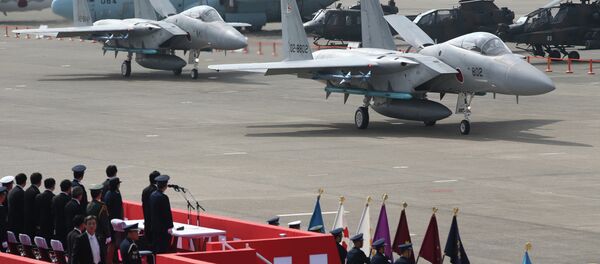What is more, the number of supporters may dramatically drop due to a number of national scandals provoked by Abe’s push to pass a bill expanding the scope of activities of the Japanese Self-Defense Forces.
Despite strong parliamentary opposition and protests across the country, the bill is likely to be approved by the parliament.
For the first time since the end of World War II, the bill may authorize the Japanese military to take part in overseas combat missions.
According to the bill, the purpose is to defend allied countries even if Japan is not directly attacked.
The bill would also abolish a set of restrictions for military to participate in UN-led missions across the world. Currently, Japanese troops have no option of using weapons.
It seems that neighboring countries, particularly South Korea, North Korean and China, are already assessing the possible consequences of the bill for the military and political situation in East Asia and the entire Asia-Pacific Region.
Indeed, if approved the bill would drastically transform Japanese defense policy, Jiang Yuechun, an analyst at the China Institute of International Studies, told Sputnik China. While the previous strategy was only defensive, the new doctrine presumes preventive strikes.
Moreover, the current militarization push in Japan is reminiscent of the country’s role in World War II as an aggressor in the Asia-Pacific Region, he added. This is why the bill has raised public outrage.
The new Japanese military doctrine would create a serious threat for the security and stability in the region, he pointed out.
"This is just an assumption, but the situation will depend on how far Japan is ready to go with its new strategy," Yuechun underscored.
The implementation of the doctrine depends not only on the Japanese Liberal Democratic Party, according to him. There is still the political opposition and the people of Japan, and they can change the situation.
"Of course, the new bill raises concerns. But it is premature to claim it would destabilize the Asia-Pacific Region," the analyst said.
"In turn, China is interested in maintaining stability and security in the region. This is why Beijing has called on Tokyo to adhere to the peaceful policy," he added.
Initially, the revision of the Japanese military strategy was not initiated by the parliament. It was predetermined by the policy of Abe’s government, particularly the expanded participation of the Japanese military in joint US-Japanese naval drills.
"No doubt, neighboring countries, especially China and South Korea, are concerned by the prospective that Japan would again become a military power. And now Tokyo is supported by Washington to create a strong deterrence mechanism against China," he said.
The new Japanese strategy is aimed to prove that the country is a major military and political player ready for serious cooperation, the analyst added.
"The cooperation would include support to the members of a now-forming anti-Chinese coalition. With the support from the US, Japan would seek to enter new defense markets. This is a formidable step for Japan to boost its military power," he explained.



